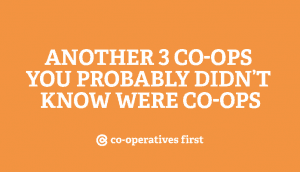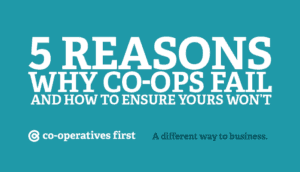It’s a misconception that co-ops don’t have or need profit. In fact, it’s just as important for co-ops to be profitable as other types of business – the difference is what co-ops do with that profit.
Profit (sometimes called surplus) is the money a business has left over after it’s paid all its operating expenses — wages, rent, inventory, etc. Some think if co-ops focus on profit, it takes away from their core mandates and meeting the needs of members.
There’s no reason for this to be the case. Co-ops do need to keep members’ best interests in mind, but they also have to remain viable to keep providing for their members. Making a profit is a big part of that. Profit is a sign that the business is healthy, members are engaged, and the co-op is doing what it’s supposed to be doing. In short, purpose and profit are interlinked.
Many co-ops distribute profits back to their members — it’s a common feature of co-operatives, and reason enough for the business to want to make sure it is profitable. But that’s not the only reason why co-ops should do more than just break even.
Here are five (more) reasons a co-op should make a profit.
1. Profit ensures the co-op is covering its costs
This one might seem like a no-brainer. If a co-op makes less money than it spends, it’s a problem. A co-op that doesn’t make profit may have to take on debt to stay in business, or rely on member equity and reserve funds. This not only restricts the financial wiggle room that profits provide, it erodes the co-op’s rainy day funds.
Co-operatives (even not-for-profit ones) need to turn a profit to stay financially healthy. Even if co-ops don’t return their profits to their members, making big contributions to a reserve fund and paying off debt are important uses of profit.
2. Appeal to investors and lenders
Most co-ops can’t raise enough start-up funds from their members alone. To make up the difference, they might issue investment shares to raise more money, or get a loan. Accessing money in these ways means the co-op needs profit — either to pay back the loans, or give investors a return on their investments. Westlock Terminals, for example, aims to provide investment shareholders with a 7% annual return.
Profit can also reduce a co-operative’s liabilities. If a co-op has a profitable year, it could place a chunk of money on its debt or purchase some investment shares back from their holders. This would reduce the amount of interest or dividends the co-op issues, and allow it to redirect profits to members.
3. Invest in the business
Co-ops can use their profits to directly benefit the business itself. By investing in new equipment, new products, expanded spaces, and more, co-ops can better compete with other businesses in their market.
To make these kinds of investments without taking away from their regular operations, co-ops need profit. Without having profits to use, co-ops would have to take on debts or other liabilities to fund their initiatives.
4. Contribute to community
In addition to giving profits back to their members, many also give back to the communities where they operate. This might take the form of donations to charities, supporting local schools, or giving back to members in innovative ways.
The members of the Co-operative Retailing System, for example, give back to communities in a variety of ways. This includes partnering with local food banks, the Community Spaces program, Fuel Good Day, and other charitable programs. Without profit, co-operatives would have to limit how much they give back to their communities.
5. Ability to respond to a changing market
Co-operatives also need to be profitable so they can respond to changing conditions in their market.
For example, as provinces roll out various carbon tax schemes, companies that sell fossil fuels should probably invest in ways to decrease their carbon footprint. It doesn’t need to be an ideological thing. Because of the changing tax environment, it just makes good business sense. Using profits to prepare for a transition to improve efficiencies or create new products is an important strategy to remain ahead of the curve.
Without profitable operations, a co-op’s focus will be on what’s happening today, not what’s coming tomorrow. Failing to conduct market research and invest in new business opportunities can lead to stagnant growth and loss of market share.
Co-ops’ profit is a conversation
Co-ops need profit. Generating a profit is, and should be, a part of how co-ops serve their membership, and co-operatives need to be competitive and financially sustainable to ensure they can continue supporting their members for years to come.
Plus, the debate around whether co-ops should turn a profit shouldn’t be black and white. Because it’s a conversation about how a business achieves its goals while preparing for the future and responding to change. And part of understanding and realizing the purpose of a co-op is figuring out how best to use its profits.

 Written by
Written by 


